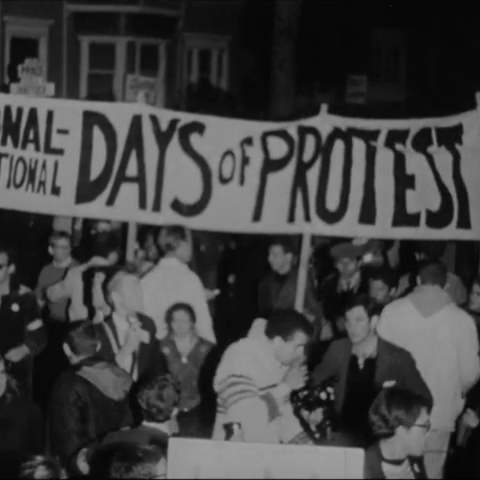Retrospective: Un-American Activities

Between 1962 and 1989, the Leipziger Dokumentarfilmwoche screened more than 150 films from the U.S. that, due to their critical stance towards their own country, were considered by the GDR to be representative of “another America.” The “Un-American Activities” Retrospective is an invitation to re-discover this hitherto neglected aspect of Leipzig’s festival history.
In addition to the programme during the festival week, the Retrospective also includes thematically conceived film programmes before and after the festival at the Luru Kino.
Barbara Kopple, Deborah Shaffer, Allan Siegel, and Gordon Quinn will be guests in Leipzig for in-person film panels. We will hold online panels with Christine Choy, Robert Cohen and Jim Klein. On October 31, we invite you to the Luru Kino for a panel forum with American guests of the Retrospective, which will focus on the Vietnam War as a turning point in world and film history.

Einer ganzen Generation von US-Amerikaner*innen wurde das militärische Vorgehen ihres Landes in Südostasien Auslöser für ihre Politisierung und Teilnahme an Protesten. In diesem Umfeld entwickelte sich eine Dokumentarfilmarbeit, die Film als argumentative Waffe einsetze.
Dieser Generation widmet DOK Leipzig ein Panel mit Gesprächen, Filmausschnitten und der Wiederaufführung von „Sons and Daughters“, dem Leipziger Goldene-Taube-Gewinner von 1967.
Mit dem Film: Sons and Daughters
Ausgehend von studentischen Protesten gegen den Vietnamkrieg in Berkeley entfaltet sich ein Zeitporträt der US-amerikanischen Gesellschaft und ihres wachsenden politischen Bewusstseins.
Jerry Stoll | USA 1967, 108 min
Digital file courtesy of the UCLA Film & Television Archive
Dieser Film wird im DCP-Format gezeigt.
- Wann: Freitag, 31.10., 10–16 Uhr
- Wo: Luru Kino
Tobias Hering
Tobias Hering ist freier Filmkurator und Publizist mit einem Schwerpunkt auf thematischen Retrospektiven und Archivprojekten. Zu den Projekten der letzten Jahre gehörten werkbiografische Filmreihen zu Amos Vogel und Jay Leyda sowie mehrere Programme zu Filmbeziehungen zwischen der DDR und den USA, die mit der Retrospektive „Un-American Activities“ fortgesetzt werden.
Tilman Schumacher
Tilman Schumacher ist Filmhistoriker, -kurator und -kritiker. Er ist Wissenschaftlicher Mitarbeiter am Zeughauskino des Deutschen Historischen Museums, Ko-Kurator des Leipziger GEGENkino Festivals und des Berliner Kinokollektivs Zelluloid42 sowie Redakteur der filmhistorischen Zeitschrift Filmblatt. Sein kuratorischer Fokus liegt auf der deutschen und US-amerikanischen Film- wie Kinogeschichte.
On first reflection, it seems unlikely that films from the US were screened in appreciable numbers at the Leipzig Dokumentarfilmwoche[i] before 1990, let alone that they played an important role. We were certainly surprised when we found that according to the official publications from between 1962 and 1989 more than 150 US film productions were shown and that, starting in 1962, there was not a single festival edition in which the leading nation of the “imperialist West” was absent. In the 1970s and 1980s, an average of six contemporary US productions were screened in Leipzig, with more than ten in some years. Some were awarded important prizes, and on several occasions American award winners were subsequently appointed to the International Jury.[ii]
What kind of films were these, what is the image of America they transported and what drove those who made them? However selective the Leipzig line-ups doubtlessly were, they tell an astonishingly rich story of independent political documentary in the US. Next to relatively well-known names – Leo Hurwitz, Richard Leacock, Lionel Rogosin, Emile de Antonio, Barbara Kopple, Michael Moore – we also came across multiple mentions of lesser-known documentary filmmakers such as Robert Carl Cohen, Jerry Stoll, Julia Reichert, Jim Klein, Glenn Silber, Deborah Schaffer or Marc Weiss in Leipzig’s programmes and lists of winners.
What impressions were left by the encounters with their films which presented an America that was incompatible with a simplistic image of the US as the enemy? But did this simplistic image even exist in the GDR beyond official rhetoric? After all, rebellious films from the US confirmed the positive aura of freedom and progress that America also stood for and that shaped everyday and youth culture in socialist Germany hardly less than elsewhere. When films dealt with the growing resistance of the suppressed and outclassed, they confirmed the GDR cultural-political dictum that there was indeed “another America” within the “imperialist” US, one that could be regarded as a political ally.
One need only recall the enormous popularity of prominent representatives of this “other America” in the GDR, which the SED (Socialist Unity Party of Germany) knew how to turn to its advantage, both in domestic and foreign politics. The demonstrative solidarity with Paul and Eslanda Robeson, Angela Davis, Ben Chavis and other representatives of the Black civil rights movement, in conjunction with the party and state leadership’s public stance against the Apartheid regime in South Africa and US interventionism in Latin America and Vietnam, fed into an at least outwardly coherent profile.
Meanwhile, US-American filmmakers also had their own motivations for taking part in the Leipzig Dokumentarfilmwoche. The Festival was an international stage where their films received the attention and recognition they got only from small, interested circles in their own country. What is more, a number of contributions could definitely be seen as critical interventions against the rather self-complacent worldview that prevailed in Leipzig at the time. When they denounced the arrogance of power, for example, reported on prison revolts or reminded their viewers of unfulfilled hopes of progress, they also touched on neuralgic issues of the SED state. Such spillover effects in turn were presumably even desired and intended by some of the decisionmakers in Leipzig. On no side and at no time were things ever clear-cut.
We realised early in our research that the discoveries within the timeframe and film-historical scope defined by us would be much more numerous than we had suspected. This gave rise to the idea of extending the DOK Leipzig 2025 Retrospective beyond the duration of the Festival. Before, during and after the Festival week, thematic parts of the Retrospective will be screened at the Luru Kino at the Spinnerei, an arthouse cinema in the west of Leipzig. This will kick off with a small retrospective of one of the most important protagonists of the cinematic relationship between the GDR and the US: Emile de Antonio, who was a living legend as a cinema rebel in Cold War America but whose films are rarely shown nowadays. As a contrast to de Antonio, who was perceived as a lone fighter, we will present – after the festival week – two film collectives at the Luru: the Newsreel Collective, from which evolved the still existing platform Third World Newsreel in the mid-1970s, and Kartemquin Films from Chicago, a production collective whose roots date back to the 1960s and which is also still active.
In the festival week itself, we will cover the period from the 1960s to the 1980s. At the CineStar cinema in the city centre, we will unfold the broad thematic and cinematographic spectrum that films from the US brought to Leipzig: resistance against the anti-communist paranoia of the McCarthy era, the trauma of the Vietnam War, the fight against racism and the hubris of white supremacy, labour struggles and strike movements as well as a left-wing (and often feminist) historiography of the US for which an urgent need was felt during the neoconservative Reagan era and which brought forth films about the 1920s and 1930s that even – or perhaps especially – today seem disturbingly urgent.
This applies, nolens volens, to the entire Retrospective, which enters into a dialogue with the current, immensely polarising US-American domestic and foreign politics. Resistance against American suprematism and Donald Trump’s increasingly accepted politics of contempt is forming both within and outside the US – “Un-American Activities” recalls the historical precursors of such protests.
When we began, we could hardly have foreseen how topical and, in some cases, painfully acute the films of this Retrospective would become. But when we started to contact protagonists of this “other” American cinema it became clear that democratic and humanistic values they once championed in their films are now at stake or being jettisoned with a vengeance. Barbara Kopple, Deborah Shaffer, Allan Siegel and Gordon Quinn will be in Leipzig for film talks. We will host online talks with Christine Choy, Robert Carl Cohen and Jim Klein. And we will establish a discussion forum with American guests of this Retrospective at the Luru Kino, which will focus on the Vietnam War as a turning point in global and cinema history.
A history of the reception of left-wing American documentary films from a Leipzig perspective remains to be written. Perhaps these re-encounters will mark the starting point.
Tobias Hering, Tilman Schumacher
[i] From its founding year in 1955 to the end of the GDR in 1989, the Leipzig Festival had a number of different names. Within the period covered by this Retrospective, it was called “Internationale Leipziger Dokumentar- und Kurzfilmwoche” (International Leipzig Documentary and Short Film Week), to which was added “für Kino und Fernsehen” (for Cinema and Television) in 1968.
[ii] These numbers do not include Retrospectives dedicated to US-American filmographies, with which Leipzig set important milestones: “Robert Flaherty” (1964) and “American Social Documentary” (1981). The “Un-American Activities” Retrospective focuses on films that were screened in the Leipzig competitions as new productions or in the so-called Information Programmes.
This Retrospective is funded by the Foundation for the Study of the Communist Dictatorship in Eastern Germany. This year, the Retrospective takes place in cooperation with Luru Kino. DOK Leipzig would like to thank the Saxon State Archives and the DEFA Foundation for their support in making the matinees possible.